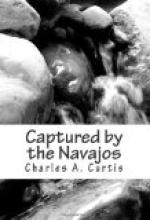Mr. Hopkins said he had crept out to the shrubbery on the edge of the precipitous river-bank, to the left of the slope, just before my arrival, and had seen on the opposite shore a small party of men moving through the willow branches towards our left. He believed it was a flanking-party, intending to make a feint from that direction and enable the main body to charge through the notch in the bank. Believing the repelling force to be but seven, the Indians were quite sure of success.
I was convinced that Mr. Hopkins’s inferences were correct; but in order that no mistake should be made, I sent two veterans in frontier service, Privates Clary and Hoey, to reconnoitre both flanks. They were gone half an hour, and returned with the information that no demonstration was being made towards our right, but that a dozen or more men had gathered on the opposite shore, at a point where they could cross and turn our left flank.
Preparations to meet this movement were begun at once. Sergeant Frank was sent to the ambulance with orders for the men in charge to bring in the animals, two at a time, and fasten them in the rear of the stable and stack. This was easily accomplished in the darkness. The ambulance was left in charge of Vic.
While this was going on, and I was overlooking the construction of rifle-shelters on the flanks, Sergeant Henry approached and asked if he could not be of some use. Something in the tone of the boy’s voice showed me he felt he had been neglected, while his brother had been kept busy.
“What would you like to do?” I asked.
“Does a soldier choose his duty, sir?” was the reply, uttered with some dignity.
“Not usually, sergeant, it is true. I have a very important thing for you to do—something for which I was intending to look you up. Go and find Private Clary, and tell him to help you carry several armfuls of hay from the stack to the right of the slope. Make a heap, so that when it is lighted it will illuminate the approach from the creek. Ask Mr. Hopkins if he has any kerosene or other inflammable stuff to sprinkle on the hay and make it flash up quickly and burn brilliantly. Then throw up a shelter in which you can lie and be ready to light the hay when signalled.”
“Yes, sir. Thank you. I’ll attend to everything.”
Not more than fifteen minutes had elapsed when the boy sergeant returned and informed me that the bundle of hay was prepared and a shelter constructed.
“Mr. Hopkins has two gallons of axle-grease and two quarts of spirits of turpentine.”
“Excellent. Mix them together and sprinkle the hay thoroughly. Then place yourself in the shelter, and when you see a light flash from the west window of the house light your bonfire.”
“I’ll do so, sir,” and the boy ran away in the darkness.
An hour had passed when loud whoops gave us warning of the enemy’s approach. It was the war-cry of the terrible Apaches. Not a sound came from the creek. I strained my eyes in that direction, but nothing was visible in the black darkness beneath the pendulous branches of the willows.




